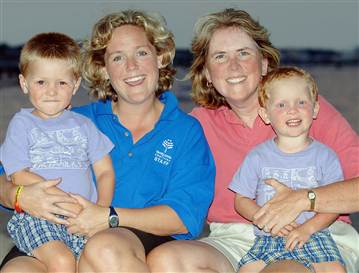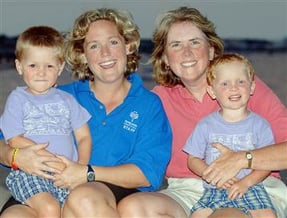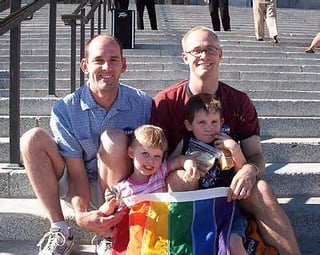Part 2: Did SCOTUS Really Advance the Rights of Same-Sex Families?
July 16th, 2013 | 10 min. read

The Super Yuck Factor after Windsor and Hollingsworth
How far did we really get in advancing the rights of same-sex families created through third-party assisted reproduction?
By Elizabeth Swire Falker, Esq. The Stork Lawyer®
Continued from Part 1...
Now everyone has something in their life that presents them with what I call a "Yuck Factor". Yuck Factors are things that when we think about it or look at it we say "yuck". Whether you are 4 or 40, you have a Yuck Factor. Obviously what makes you say "yuck" when you are 40 is far different than when you are 4. I am sure if you think about it there is something out there in the great cosmos that warrants a "yuck." One of my biggest "Yuck Factors" unfortunately surrounds a large part of my law practice and adoption and family formation law. Some of us -- those of us who are either socially or medically infertile and who choose to adopt -- have to get a "license" to have a child. While many people go out and get accidentally pregnant and groan for 10 months about how unprepared they are to be parents, I had to spend 10 months proving to an adoption agency that I would be a good parent. If I had been fertile then I wouldn't have had to prove my worthiness to parent, or get what I call my "license" to parent. Yuck.
However, in the grand scheme of that cosmos I referred to before, having adoptive parents go through home studies and background clearances makes some sense. Insofar as that "license" to parent reassures a birth family that I am going to provide a safe and loving home, I can swallow this particular Yuck and remind myself and my clients that while I may disagree with the law, it has a purpose. (As an aside, there really isn't any "license" issued in this process, although in New York you do obtain a Court Order deeming you to be a Qualified Adoptive Parent).

More Yucky than my license to parenting, however, surrounds what my gay and lesbian clients and friends -- who are "socially infertile" -- have to do to protect their families which are more often than not created through third-party assisted reproduction like egg donation and surrogacy. Perhaps more offensive than my "license" to parent, perhaps more insidious, is the fact that not only do certain States not recognizes same-sex marriages but these States also do not recognize the families created from these third-party assisted reproductive arrangements and same-sex marriages. So while we are standing at the threshold to national recognition of same-sex marriage, the children conceived from these marriages remain (frighteningly) unprotected. This is my Super Yuck Factor.
I had hoped that my Super Yuck Factor would be addressed and resolved by Windsor and Hollingsworth, but it wasn't. Section 2 of DOMA was not addressed in these cases and because it wasn't the rights of individual States to ignore the needs and rights of children and families created through same-sex marriages remain as vulnerable today as they did last week. Perhaps more so because of a false sense of security these cases may bring to the LGBT community. Just because the right to marry has expanded (Hollingsworth) and the rights of married couples have expanded by virtue of Federal recognition of those marriages (Windsor), does NOT bring a concordant expansion or recognition of the rights of the children of same-sex marriages. At least not when that marriage and family can be ignored by another state.
So looking at two sets of hypothetical clients,Ted and Tom in California, and Lisa and Leslie in New York, let's see how things have changed (or didn't change) this week. Expanding our hypothetical, let's say Ted and Tom used an egg donor and conceived twins who were carried by a gestational carrier (also known as a surrogate). The twins are each biologically related to either Ted or Tom. Lisa and Leslie didn't need a surrogate; Lisa "donated" her eggs to Leslie, who carried and gave birth to a child conceived using anonymously donated sperm. As a result of Hollingsworth, Ted and Tom now have a legal right to have each of their names on their respective children's birth certificates, a right which Lisa and Leslie previously had available to them by virtue of New York's longer-standing recognition of same-sex marriage. As a result of Windsor all of their children are now entitled to inherit social security or other "survivor" benefits. However, should Ted and Tom, or Lisa and Leslie, ever move to Florida or any other state that does not recognize their same-sex marriage -- or even travel there and have some kind of a life threatening accident take place -- the birth certificates with their names on them may not be sufficient for Ted and Tom, or Lisa and Leslie, to make decisions regarding the care and custody of their children. Nothing in either of these cases changes the fact that the State of Florida (or whatever state may be at issue) does not recognize same-sex marriage. Nor, more importantly, does Florida have to recognize Tom's right to parent Ted's genetic child or for Ted to parent Tom's genetic child; or for Lisa's rights to be recognized as the biological mother of the child which Leslie carried and to whom she gave birth.
In my job as reproductive lawyer, I have the ability to help Ted and Tom/Lisa and Leslie protect their families from the discrimination they face from states that do not recognize their lifestyle or family. In order to prevent potential issues from being raised should Ted's and Tom's rights, or Lisa's and Leslie's rights as parents ever be challenged from or by a State like Florida, they can enter into a second-parent adoption. Both Ted and Tom and Lisa and Leslie live in States which provide one parent the ability to adopt the other parent's genetic child. Much like a step-parent adoption, this procedure will enable Ted to adopt Tom's genetic child (and for Tom to adopt Ted's genetic child). Similarly, through a second-parent adoption proceeding, Lisa will be able to permanently or forever establish her genetic connection to the child she had with Leslie.[1]
Why, you may be asking do they need a second-parent adoption if their names are on the birth certificates? Good question, and one that can only be answered in part due to the scope of my blog. Long story short, a birth certificate is not conclusive proof of parentage. A birth certificate is only a presumption, and one which a parent or the State of Florida could attempt to challenge -- notwithstanding the genetic connection underlying these two families' relationships. As Florida doesn't recognize same-sex marriages, it could challenge whether Ted and Tom are truly a family, especially where as here donor gametes/eggs were used to conceive their twins. Like I said, Super Yuck Factor. An Order of Adoption, or of a second-parent adoption, however, ends the discussion and basically tells the State of Florida that it must accept the legal parent-child relationship between this father/mother and child. Sometimes in third-party assisted reproduction proceedings attorneys can obtain orders from judges stating that someone is a parent. These "parentage" or "birth" orders are often used to get Ted's or Tom's name placed on the birth certificate in the first place (lots of different factors involving state law are at play here so if you are thinking about entering into a surrogacy arrangement like Ted's and Tom's or doing something like Lisa and Leslie, please consult with a reproductive lawyer in the state where you reside and the state where the baby will be born to discuss the issues outlined in this blog). However, for reasons which (of course) exceed the scope of this blog (and yes, I'm as tired of saying that as much as you're tired of reading it!), that parentage or birth order does not always have to be honored by a court located in another jurisdiction or in our hypothetical, the State of Florida.
In contrast, however, Orders of Adoption (and second-parent adoption) must be accorded something called "Full Faith and Credit" by all other states. That is, upon presentation of an Order of [Second-Parent] Adoption, Florida (or another state which is unfriendly to LGBT families) will be forced to recognize the parental rights of the adoptive parent. Accordingly, then, my recommendation has been and sadly will continue to be -- despite the groundbreaking decisions of Windsor and Hollingsworth -- that Ted and Tom, and Lisa and Leslie, should enter into second-parent adoptions in order to ensure that their families are forever recognized as families.
Although huge steps have been taken this week, and Windsor and Hollingsworth are truly wonderful cases, my conversations with my clients will remain largely the same tomorrow as they did earlier this week. I will advise Ted and Tom/Lisa and Leslie that --dependent on the laws specific to their situations in the states in which they reside -- they may need to enter into a second-parent adoption to ensure that their family is protected wherever they may go and wherever they may choose to live. While Ted and Tom now have the ability to marry and to create a family within a marital union, Windsor and Hollingsworth do no protect Ted and Tom and their children outside the State of California. Should Ted and Tom, or Lisa and Leslie, move to another state in which their marital status is not recognized, there is only one way that they can ensure that their family is protected, and that is through a proceeding known as a second-parent adoption.[2]
It has been a remarkable week for the gay and lesbian community. I look forward to reading the wedding announcements of all those couples in California who have been waiting for Proposition 8 to be taken off the books once and for all! Today is that day! I am thrilled that the United States Supreme Court has stated that DOMA's distinction between, or separation of heterosexual and same-sex couples, violated the Equal Protection Clause! I just wish, I so wish, that I no longer have to recommend that same-sex families entering into third-party assisted reproductive arrangements enter into adoptions to protect their families from the laws of those states which disagree with the tenants discussed in Windsor and to an extent, Hollingsworth. I guess I am going to have to wait for someone else to raise my Super Yuck Factor with the Supreme Court. I just hope Justice Kennedy -- or someone like him -- is sitting on the bench to hear the case of the Super Yuck Factor v. United States of America. (And hopefully it will have a better title!!)
About the Blogger.
Known by most as The Stork Lawyer®, Elizabeth Swire Falker (“Liz”) graduated from Wellesley College and The Benjamin B. Cardozo School of Law, where she earned a Jacob Burns Medal for scholastic achievement. After undergoing seven years of assisted reproductive technologies and adoption in an effort to create her own family, in 2004, with the publication of her first book, The Infertility Survival Handbook (Riverhead), she transitioned her career from commercial litigation to focus solely in the areas of reproductive and adoption law. Liz also owns an Egg Donor Advocacy Agency (The Stork Lawyer Connection™), and is co-owner of an escrow management agency which exclusively services the third-party assisted reproductive industry (The Stork Escrow Management Connection, Inc. ™). To critical acclaim, in 2006, Liz published her second book, The Ultimate Insider’s Guide to Adoption (Warner Books). She also has published two law review articles including, The Disposition of Cryopreserved Embryos: Why Embryo Adoption is an Inapposite Model for Application to Third-Party Assisted Reproduction, 35 William Mitchell L.R. 489 (2009). Inspired by the success of her blog which has been listed by the American Bar Association among its directory of best legal blogs[1], Liz currently is finishing up the first part of an E-Book series demystifying third-party family building.
Liz has served on numerous panels as an expert on reproductive law, is regularly interviewed on topics related to adoption and third-party parenting, and formerly taught a seminar at Pace University School of Law on family formation law. She is a professional member of the American Society for Reproductive Medicine and the American Bar Association’s Section on Family Law, and it’s Committees on Assisted Reproduction and Genetics Law, Bioethics and the Law, and Adoption Law. You can find more information about her background and her practice at www.storklawyer.com .
[1] Leslie, although the birth/gestational mother, may also want to consider taking steps to protect her legal relationship with the child she delivered as she doesn't have a genetic connection to that child and presumably (and hopefully) Lisa didn't relinquish parental rights to their child when she "donated" an egg for purposes of the conception of their child.
[2] Please note that not all states offer second-parent adoption proceedings. As noted within the body of this blog, if you are considering entering into a third-party assisted reproductive arrangement such as those described herein, please consult with an attorney practicing in the area of third-party assisted reproduction to learn what steps are available to you to protect your family as described herein.
Elizabeth Swire Falker, Esq., P.C.
Known by most as The Stork Lawyer®, Elizabeth Swire Falker (“Liz”) graduated from Wellesley College and The Benjamin B. Cardozo School of Law, where she earned a Jacob Burns Medal for scholastic achievement. After undergoing seven years of assisted reproductive technologies and adoption in an effort to create her own family, in 2004, with the publication of her first book, The Infertility Survival Handbook (Riverhead), she transitioned her career from commercial litigation to focus solely in the areas of reproductive and adoption law. Liz also owns an Egg Donor Advocacy Agency (The Stork Lawyer Connection™), and is co-owner of an escrow management agency which exclusively services the third-party assisted reproductive industry (The Stork Escrow Management Connection, Inc. ™). To critical acclaim, in 2006, Liz published her second book, The Ultimate Insider’s Guide to Adoption (Warner Books). She also has published two law review articles including, The Disposition of Cryopreserved Embryos: Why Embryo Adoption is an Inapposite Model for Application to Third-Party Assisted Reproduction, 35 William Mitchell L.R. 489 (2009). Inspired by the success of her blog which has been listed by the American Bar Association among its directory of best legal blogs, Liz currently is finishing up the first part of an E-Book series demystifying third-party family building.

